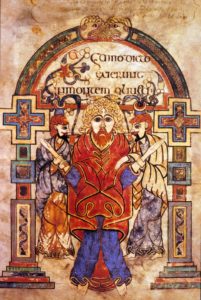Synodus prima Sancti Patricii, also known as the Statute of the Synod of Bishops is an Irish Celtic religious statute. The date of the statutes original form is unknown, it could be anywhere from the 5th to 7th century AD. At this time Christianity was being established in Celtic Ireland. It was in fierce competition with pagan beliefs and the Druids. The Statute sets out rules for the clergy and followers of the Christian faith.

§ Introduction. We give thanks to God the Father, the Son, and the Holy Spirit; we bishops, Patrick, Auxilius, and Isserninus, send a greeting to priests, deacons, and all of the clergy. It is more appropriate for us to give caution to the careless [members of the church] than to condemn those things that have already been done; just as [wise King] Solomon [of the Old Testament] says, “It is better to explain error than to get angry.” Our judgments have been recorded below, as follows. […]
§ 3. Clerics should not be roaming around the public [without supervision]. […]
§ 7. If a cleric should back a pagan financially with any amount of money, and if that pagan should deceive the cleric, the cleric should pay the debt from his personal funds; for if he take up weapons to fight against that man, his case will have to be judged outside the church [i.e., the church will not stand up for him]. […]
§ 12. The church may not take alms from pagans.
§ 13. A christian who has committed murder, extramarital sex, or does business with a fortune-teller, in the manner of a pagan, should do a year’s penance for each sin. After that year of penance is over he should appear with witnesses before a priest to be forgiven. […]
§ 15. A christian who believes in the banshee – understood to be a practitioner of black-magic – is to be condemned; whoever has condemned his human soul is not to be accepted into the church until he retracts his statement with his own voice, and he must repent with sincerity. […]
§ 18. A christian woman who has married one man and then left him to marry another man should be excommunicated.
§ 19. A christian who commits fraud regarding debt, in the nature of certain pagans, is to be excommunicated until he pays off his debt. […]
§ 22. No priest should open his church up to people until it has been consecrated by his bishop. […]
§ 29. No British cleric is permitted to minister amongst us [in Ireland], even if he lives amongst the people, unless he has an official letter [of authority]. […]
§ 36. A monk roaming without the permission of his abbot should be punished.
[products tag=”KS2 History Training”]
Do you want to find other Primary Sources for use in your lessons, or for research purposes? Visit our Primary Sources page to see which areas we currently have a range of sources for.